More than one New Canaanite urged us to talk to Micaela Porta, co-founder of Pesticide-Free New Canaan, for a possible article here on our local news site.
The nonprofit organization’s website is itself a wonderfully concise resource for environment- and wellness-minded residents (as is this new, informative newsletter from the New Canaan Conservation Commission, a group of which Porta is a member).
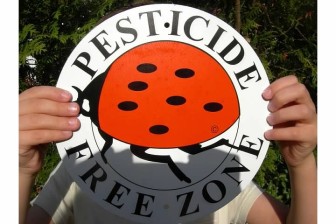
Miki: "The Pesticide Free Zone sign that is the symbol of our movement." Contributed photo
In researching Pesticide-Free New Canaan I came across this Q&A, which does a very nice job of reviewing the nonprofit organization’s history and mission, with useful and succinctly stated tips and checklists for residents who want to pursue organic garden and lawn care (asking, for example, “What are the top three things I can do to protect my loved ones and myself from harmful chemicals in their gardens and lawns?” and “Do you have any recommendations for budget-friendly, safer, pesticide-free strategies?”)
[selfie]
Just as we met Thursday morning and sat down at that window table in Dunkin Donuts on Elm Street, New Canaan’s Beth Jones popped over to say a quick hello, and when I told her I was meeting Miki (as Porta is known) for an installment of “Resident Expert” on NewCanaanite.com, the immediate response was: “Thank goodness we have such an expert resident. She’s a treasure.”
During our conversation—transcribed in full below—I got a strong sense of what Jones meant. (Ultimately, I’m putting this in “Faces of New Canaan” instead of “Resident Expert,” but it could’ve been either one.)
We did discuss Pesticide-Free New Canaan, which Porta founded with town resident Heather Lauver: its history, status, place in New Canaan, science, support, partners.
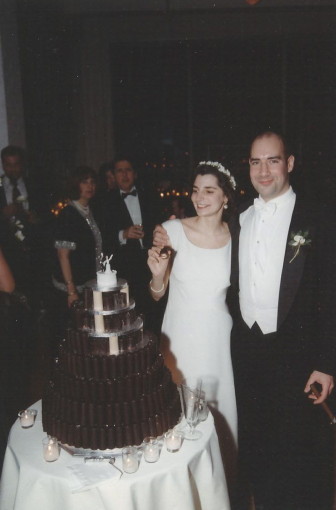
"The wedding picture is taken by our wedding cake, which Victor designed and made himself out of Yodels--553 of them, cut precisely according to his mathematically calculated plan. There weren't enough Yodels on the island of Manhattan to make this cake, so he had to go to an enormous supermarket in New Jersey off route 17 to get them."—Micaela Porta
We also talked about her past in helping to create art shows, ghost-writing and editing—and meeting an eco-minded investment banker who one day would marry her, designing with his mathematical brain the couple’s wedding cake, which consisted entirely and precisely of 553 Yodels.
One final note before we get to our conversation. After talking, Miki emailed with one more insight into her own background and motivation—her own parents (and her husband’s) are Cuban:
“This is why it’s important,” her email said. “Our families had to leave their country because of a Communist revolution (takeover). Overnight, they lost their nation, their money, their friends, people were killed, and it’s still going on 54 years later! I have always felt in my bones how important it is to be involved, to be actively helping by finding out the truth and moving it forward in the simplest of ways, not in large, sweeping gestures that often lose steam or come too late. Civic mindedness is a gift we give each other that pays back large dividends. New Canaan is a high-functioning, stable place because of it.”
Read on.
***
Micaela Porta: I’ll just give you just a minute of background. Just like 30 seconds of background. The way this started was that another mom and I realized that there were an awful lot of these yellow flags everywhere. These little pesticide flags, all over town. And one day we just kind of noticed one. I was picking my son up from nursery school—
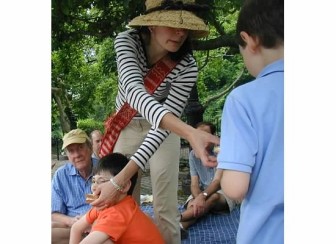
Micaela Porta: "Myself feeding both my kids (Victor 13, Lucas 8) simultaneously in Central Park during one of our thousands of picnics (we could picnic on the side of a road, possibly even a bathroom)." Contributed photo
New Canaanite: —Where?
—St. Mark’s Nursery School. And I was walking in and I saw the little yellow flag, and I noticed really for the first time what the flag had on it. It looked like a mom holding the hand of a child with a dog next to them. And this described 98 percent of what was going on at St. Mark’s in that moment.
You have a dog?
I don’t now.
You did at the time?
I did many years ago, but not now.
You identified with the figure in this flag somewhat yourself.
Absolutely. And there was a golden, my friend’s golden retriever was sitting not three feet from this sign when I saw it. So I kind of went, ‘Oh my god, look at that sign.’
At this point in your life, what was your experience with organic versus synthetic anything? Or landscaping and lawn care. Or awareness of nourishment, nutrition or anything in this big field. What was your experience? Because that seems like a critical moment for you. So I want to understand a little better what you’re bringing to that moment. What was your educational background? What was your professional background? What were your interests?
OK, that’s a good question. What I was bringing to that moment was, I did not have a lot of gardening experience. I was not a landscape person. I didn’t know anything about seeds or GMOs or chemicals. I kind of had a sense that organic milk was better than regular milk, because there were no hormones in it, no antibiotics. That kind of stuff. I was kind of bringing very basic mommy knowledge about ‘Feed your kid this instead of that.’ But I was someone who had moved from New York City, had used roach—
—Where are you from originally?
Well, I grew up in Wilton.
Wilton High School?
No, I went away to boarding school.
What boarding school?
When did you graduate?
’86.
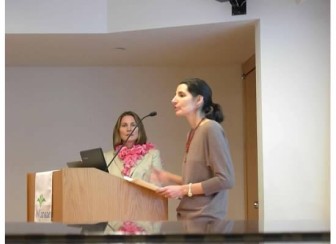
Heather Lauver (L) and Micaela Porta speaking at New Canaan Library. Contributed photo
’86. And where did you go to university?
Tufts. And I majored in English and art history, so my background is as an editor and a writer. I had specialized for many, many years in architecture and design. And I had an interest in certain environmental issues, only insofar, I think, as that it affected what I was feeding my little babies. Common sense things, like: It’s not good to idle your car. But I wouldn’t say I was someone who brought a lot of information to this. It was more like I saw this sign and went, ‘Oh my god.’
How old was your—
—My son, my youngest was at that point three.
Your youngest was three. He was the one who was at St. Mark’s Nursery School.
And so my oldest was, at that point, eight or nine.
At what school?
At South.
At South. And you have two kids or more kids?
I have two kids. They both have asthma, one has learning disabilities. So I was sort of aware that there were environmental factors that could affect these kinds of things. That was on my radar too.
How severely asthmatic are your children?
They were pretty bad. One nearly died, was hospitalized when he was three. Barely three. And my kids have had a lot of steroids. A lot of steroids. A lot of Pregnazone. A lot of everything.
What year was this, the St. Mark’s flag?
St. Mark’s, that might have been about four years ago. Because we launched this, two-and-a-half years ago.
Your background is as a writer and editor. At that time, 2008, 2009, 2010, we’re talking. What are you doing? Are you minding—
—Freelancing.
What sorts of publications?
I was really doing book publishing. That was my background, was in book publishing.
Were you a freelance writer? Editor?
Both. So what I would do was I would ghost things for people. Mostly, people need marketing materials. They need a brochure. They’re writing a book but they’re not writers. ‘I’m an architect. I need somebody to write.’ That kind of stuff. But I was doing less and less of that, because it takes a lot of time and I have two kids and I’m a full-time mom.
When did you move to New Canaan?
We moved to New Canaan four-and-a-half years ago.
So you moved to New Canaan prior to your younger son entering kindergarten or pre-K.
Yes, when we moved to New Canaan, my older son was in third grade and my younger son started the threes program at St. Mark’s Nursery [School]. So it probably was when my younger son was four, it was his second year.
You’d been in the city?
Yes, we were living in the city. And we were urban people. We used roach spray and pesticides and all that kind of stuff so I feel like when I had that moment, what I felt was: I want to communicate this in a common-sense way to people so that they understand I’m not some kind of rabid activist. I’m an ordinary mom. In New Canaan, we’re highly educated people. So for the most part, people will understand. When you say, ‘This chemical has these effects and that chemical has those effects,’ people have something to compare it to. And if I can communicate with fellow parents, fellow citizens on a common-sense level, then maybe we can get somewhere. And I also felt that this is something really small that we can all do that makes a big difference. That can change your life.
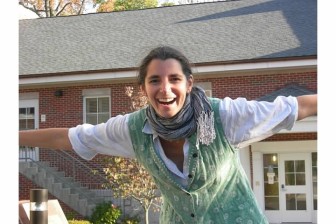
"Myself on the lawn of Park Mead Condos where we live and which we took organic." —Micaela Porta. Contributed photo
I want to go back, because now we’re talking at a point when you had been triggered by something you saw, and you sought out and assimilated a lot of information, prior to having that thought. So you see it, and you think to yourself, ‘Oh my god.’ Where do you go to get information.
OK, so I see it, and I think ‘Oh my god, I’ve never seen that before.’ I go home, spend the next X amount of time, months, doing research, through NOFA, the Northeast Organic Farming Association. NOFA’s the big one. Through NOFA, through the Internet. Take out books from the library. One thing leads to another. Start calling people I see on the Internet: ‘Hi, I see you have a nonprofit. What’s this about? Can I get some information?’ All of that. And then one day, I called a woman who I had met through a book group in New Canaan. And I just thought, ‘Wow, this woman’s really smart and I really like her.’ And I don’t know, Mike, what it was. I just said, ‘Maybe she’d be interested in this.’ And so I invite myself over for coffee and when I walk in, I tell her: ‘Look I have this idea. I want to start something, to try to communicate to parents and citizens how bad these chemicals are.’
How long is this after the flag?
After the flag, probably I would say, six months.
In your life at that point, you have an interest in writing, reading, literature. That informs your course of study at Tufts. You go into a profession that involves writing, editing. This is something a little different—
—Well, I married an environmentalist. My husband’s not a professional, but my husband is a guy who when I met him, he was working in an investment bank and I said, ‘So what do you do? What are you interested in?’ And he said, ‘Well I work in a bank but I don’t really care about that. I want to invent an environmental air conditioner.’ And I thought, ‘This guy is crazy. This guy is insane.’ And he was a guy who used to come and meet me in a suit on a skateboard. He was crazy.
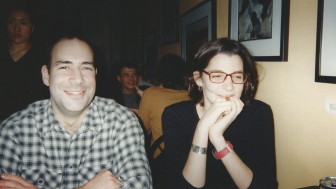
"Here we are before we were married, when I was both enchanted and mystified by the skateboarding-financial-environmentalist that is Victor Alvarez." —Micaela Porta
You were both single in the city when you met him. I assume he was an investment banker in New York.
He was in New York and he wasn’t the typical investment banker. He wasn’t on a management track. He’s someone who is kind of working there by default, like the kind of kid whose parents always raised him to study business at BU and then he did and when he graduated he got a job, but—
—I can tell just by the way you’re talking about him that his differentness was an attraction.
Yes.
But what about his environmental consciousness. Was that something you were aware of and then you liked it too?
I liked it, because I thought: Here’s a guy who is so passionate about this and he’s absolutely right. It’s so important, and Victor’s the kind of guy who, not only was he dreaming about inventing this, but then in the next breath he’ll tell you why he doesn’t use hot water in the shower.
Ooph.
Right. And so it’s part of his life. But he’s a normal person. He’s a guy who’s a Boy Scout den leader and he’s a normal guy.
Did you learn about this stuff first from him?
I did.
What did you bring in terms of your own knowledge of environmental matters?
Well, when I was at boarding school I studied environmental science with a teacher—
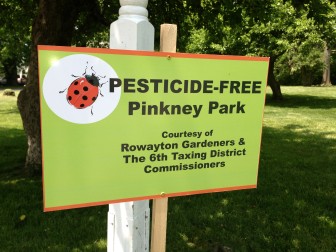
Miki Porta: "The Pinkney Park sign is from Rowayton, where they were able to make Pinkney Park an organic lawn demonstration site thanks to a presentation we gave to the Rowayton Gardeners. Because they'd invited important players from their town government to the talk, those people were able to push the button and make it happen." Contributed photo
—Part of the curriculum.
Yes. I took a lot of biology, a lot of earth science. I was interested in it. It was interesting. And one of the reasons I thought it was interesting was because it marries science with advocacy. There’s a lot in environmental studies that has to do with politics. And what’s interesting about that to me is not politics or politicians. It’s what each and every person can do to effect change, and that’s what I’m passionate about. I am a grassroots person. So my partner in this, the woman I approached, said ‘Hey, you want to have coffee, I want to talk to you about something.’ It turns out, she’s a public health expert.
Who is she?
Her name is Heather Lauver. She’s got a master’s—
—I saw her byline in the [New Canaan Conservation Commission] newsletter.
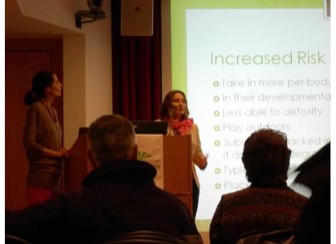
Heather Lauver (R) addressing a crowd at a New Canaan Library event, while Micaela Porta looks on. The pair founded Pesticide-Free New Canaan, a nonprofit organization. Contributed photo
Right. She is my partner. She lives in New Canaan. She’s another mom. She’s got her master’s from Yale in public health and she runs a company, an advisory health firm called HealthSpec, that’s hers. But her background was in pharmaceuticals. Pfizer sent her all over the world trying to locate hot spots of disease so that they could give away drugs. But one of the things that she discovered traveling all over Africa and South America and places was that one of the underlying causes for these diseases is environmental. So she comes back to Pfizer and says, ‘Hey guys, we can give away all the drugs in the world. But until they have clean water, until they know how to farm the soil, until the air gets cleaned up, there’s not a whole lot we can do about it.’ So this is her background, and she’s a totally corporate professional person.
When did you get married?
Married? ’99.
What does Victor do? What’s his profession?
He’s a business controller.
Business controller.
Yes, he’s a numbers guy. He’s a finance guy.
Married in ’99, you live in the city then for about eight, nine years, then move up here. You’re firstborn had been born. Is he, what, 13 now?
Yes, he’s 13 now.
Is he at Saxe?
Saxe.
Is he in the eighth grade?
Seventh.
Seventh. My niece is in the eighth grade at Saxe, why I ask. OK. You say you’re a grassroots person. I want to know, before Pesticide-Free New Canaan, before this all happens, had you been involved in nonprofits, causes—
—Yes. When I was living in New York, working as a writer and editor professionally, I also got very involved doing cultural programming, and by that I mean I curated art shows, created panels. Art was another interest of mine. I was an art history major, as well.
So you had three majors?
No, English and art history.
Oh OK, sorry.
So, on the side, and because also I’ve been working in architecture and design, and I previously worked in art books, I’m visual. I have this kind of background, so I got together with people and strictly as a volunteer was putting together art shows, panels, featuring artists, talking about issues in their work, creating catalogues, fundraised to do all this stuff. Totally on the side. I’m one of these people who feels she’s not—look, in New Canaan, everyone here is at the top of their game. We live in a very professional town. I don’t think of myself as a high-functioning professional. Half of the time, I don’t know what I’m doing—but I’m doing. So that’s what I do: I do. So I will say to someone, ‘Hey, I have an idea. What do you think about this?’ And then everyone will tell you why it’s so complicated and I’m like, ‘Oh yeah? I’m just gonna do it.’ I’m into moving forward. Keep it moving forward.
So six months pass.
Right, I get information and then it’s me and Heather. I say, ‘Heather, you want to do this?’ And she says, ‘Yes, I would.’ I said, ‘Let’s partner. I have no ego in this. This is not my baby. Let’s do this together. You would bring the public health and professional piece. I bring the grassroots. I would be—’
—In one sentence: What are you doing?
I said, ‘Let’s start a nonprofit group that raises awareness of what these chemicals are and what they do to us, and let’s teach people how to live without them. Period.’
Let me just ask you then: What do they do to us?
What they do to us, health-wise is: They’ve increased leukemia six times in children, they’ve increased asthma four times in children. They’ve been connected with learning disabilities, even autism, the incidence in autism. We’ve now got one in 80. There is a public health epidemic happening. Infertility. How many people do you know who have fertility issues, out of nowhere? Miscarriages of all kinds, unable to get pregnant. All kinds of strange things happening. Nobody knows where this public health epidemic is coming from, but some people do know. The American Academy of Pediatrics is telling us about the danger of pesticide exposure to children. Even the NIH [National Institutes of Health]. The government is not in the business of doing this. The government is approving, registering these pesticides. This is big business. So they don’t want to find problems but they can’t help but publish it. So it’s not us. There are credible, legitimate sources that are not environmental. The American Academy of Pediatrics is not a green source, and for the most part none of the sources we use are. We really want to be very objective, very factual. We want to appeal to people’s common sense and say, ‘Look, the health problems are very significant and what’s wrong with it is, we don’t see it right away.’ In a dog you do. Dogs develop cancers very rapidly from exposure to these chemicals. So it’s not unusual when you hear someone say, ‘I had a dog that died of brain cancer or lymphoma.’ It happens all the time. In people it takes much longer. So what we’re seeing is, not just in our children but their children. This is what the NIH reported, that pesticides cause inherited effects. So by exposing our children today, this means that their children will have issues. It’s very funny, my mom’s generation—I’m 45—very often my parents’ generation will say, ‘Oh we grew up with all this stuff and we’re fine.’ I say, ‘Mom, you chased after all those DDT trucks, right? And you’re fine? But we’re not fine. We’re not fine.’ I know a lot of people on thyroid medication. Fertility issues, depression. Allergies. The epidemic in allergies alone. We gave a presentation to the Food Allergy Education Group one day, because they found us and they saw that we talk about the link between pesticide exposure and allergies. There’s something called ‘multiple chemical sensitivity,’ which is a phenomenon happening now, where people who had no allergies to anything are suddenly presenting with allergies. Things you were never allergic to that now you’re allergic to.
How would you describe New Canaan’s interest in this area?
OK, this is the interest: Everybody in New Canaan has a lawn. People in New Canaan are educated and civic-minded. We are a community who do for our neighbors. We care about our institutions, we care about our neighbors, we care about our town. So if I can say to you, ‘Look, we’re busy. We don’t have attention for everything. This is one very small thing that you can do that’s going to help you, it’s going to help your neighbors, it’s going to help the town.’ I mean this stuff is going right in the water and washing into the Sound. This is not just us. This is a big deal. This is a very big deal. And they’ll do it. They will do it, and proof of that is that the town voluntarily opted out of using pesticides at the high school. They didn’t need to do that.
As a result of conversations with you?
No, not as a result of conversations with us. Just because back then, when the ban went through in the state legislature, people around the table—including Tucker [Murphy], including Beth [Jones]—said, ‘Hey guys, you know what? If this isn’t good for a 13-year-old, why is it going to be good for a 14-year-old?’ It doesn’t make any sense. Again, educated people wanting to do the best they can.
What is your group’s involvement with the town? Are you talking to [New Canaan Department of Public Works Superintendent of Parks] John Howe?
Yes, we know John well, we’re with [First Selectman] Rob [Mallozzi]. We created what’s called a Pesticide Research Fellowship, because beyond just creating awareness—
—I read in your interview with Cobie [Graber] that you were in the process of creating that two years ago.
We did it.
Tell me about it.
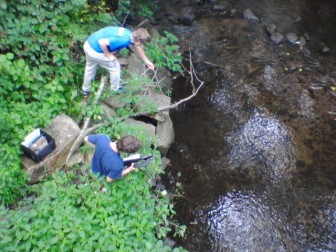
New Canaan High School students testing water in town under the Pesticide Research Fellowship. Contributed photo
It’s great. It’s a unique program that Heather Lauver wrote the curriculum for. It’s her brainchild. She decided, ‘Look, in addition to raising awareness, doing the public speaking, disseminating the information, we’ve got to create a way to gather data, so that we know how we’re doing year-to-year. This is information that the state needs to be documenting and they’re not, because they don’t have enough people to do it and they’re not looking for problems. But we can do it, and this is how.’ We partnered with Harbor Watch in Westport. That’s a group, a couple of guys, who monitor point source water pollution in that area. And they have a certified lab and they train students in water testing. So these kids learn how to test for nitrates, phosphates, E. coli. Now what does this have to do with pesticides? Those levels can sometimes be indicators of pesticide contamination. Then we brought in Connecticut DEEP [Department of Energy and Environmental Protection], and Connecticut DEEP does the pesticide portion because they have machines worth hundreds of thousands of dollars in high security labs that nobody can get into that do very, very sophisticated, sensitive pesticide analysis. Each analysis is worth 500 bucks. We could never pay for it if we had to. So what we did was we created a curriculum, got the students, go the students out in the field with Harbor Watch—
—This is after school?
This is the summer. Drawing water samples from predetermined sites as determined by Harbor Watch and Connecticut DEEP.
How many New Canaan High School kids?
They’re juniors. First time it was two. This summer we expect to have six. We try to limit it. We don’t want 100 kids out there. And the equipment is expensive and we have to fundraise for it ourselves. We’ve just funded it, up until now. Anyway, they draw the water samples from sites where we’re keen to know what’s in that water and it’s surface water. So it’s running water. Not digging into a pond. We’re going into running water to see what we’re going to find. Then those kids learn to analyze that at Harbor Watch. The Connecticut DEEP samples go to Connecticut DEEP for testing. They get tested in two different places, and then the kids also do door-to-door survey-taking. You know, ‘Hi, my name is Mike. I’m doing this project in the summer. I’m from New Canaan High School. I want to ask you some questions about your lawn care. Do you know what you’re putting on your lawn? Do you do it yourself? Do you hire out? Do you know—’
—Let me ask you about that. This time of year, you go around and you see landscaping crews. So I assume those are situations where they are not necessarily caring for their lawns in a pesticide-free way. Not necessarily. I don’t know if there are companies—
—Some do organic. Now that’s becoming more popular. People are saying, ‘I want organic lawn care.’
Does organic equal pesticide-free?
Yes.
So let me ask you: What month was the flag? What time of year was that?
I don’t remember. But probably spring.
So then that was 2009. So in roughly four-plus years, do you keep data on how many homeowners have converted as a result of your advocacy?
I wish. I wish we could. We don’t have a scientific way of proving that. I can tell you that whenever we give a presentation, about half of the people who attend end up switching.
OK. How many members do you have? What’s a member? Is that someone who signs up for your newsletter?
We don’t have a member. We have a list that’s over 200. It’s 275 people.
What do they get?
They get our email alerts, which is, ‘Here’s what to do for your lawn right now.’ They get advocacy alerts, which is, ‘This is up for vote in the legislature. Call Tom O’Dea right now to tell him you support it.’ We try not to send out too much. We keep it to tips. We let them know if we’re speaking some place that we think it’s important for them to attend.
And you say, you have conversations with the town, with John and others.
Yes, because the fellowship is through them. They’re involved in that.
It’s through DPW?
What we wanted to do is bring the town in on it. Now, the town doesn’t have any money to fund it. But what the town does do is the town supports it to the extent that the kids when they write their scientific paper, present it to the Board of Selectmen. And the Board of Selectmen then say, ‘Well we have a lot of questions about this.’ And what we’re hoping to do is get the town to support this issue. John Howe is someone who knows a lot about chemicals and organic. But he opposes the ban. We want to get to the point where the town is 100 percent on board.
And 100 percent on board means organic on all public property? Irwin, Mead, Waveny—
—You got it. Eventually. Because right now it’s only schools.
What other community organizations—public, private, nonprofit—are you plugged into in a way that’s direct, where there’s some information you’re getting them, there’s advocacy they’re hearing form you that affects the way they do XYZ. Talking about Garden Club, Beautification League, groups like that. Are you involved with any of these groups?
I am. I sit in the Conservation Commission.
How long have you been on the Conservation Commission?
Two years. I also sit on the vestry at St. Mark’s and I became a very squeaky wheel at St. Mark’s.
Like that whole field for the May Fair? Their own property?
Yes. For their own property. You know, the Nature Center had a bee die-off. They lost a hive a couple of years ago from pesticide poisoning. And even though the Nature Center is pesticide-free, bees work within a three-mile radius. So those bees were contaminated outside the Nature Center. So I’m happy to say that the entire St. Mark’s campus is organic. They don’t use pesticides on their lawns.
There won’t be a mom showing up and seeing a yellow flag this spring.
No.
OK.
So I do—
—Sorry, I wanted to stay on Conservation Commission for a second. Because I’m always interested, as a reporter you cover these volunteer groups—Conservation Commission, P&Z, Board of Ed, whatever—and you start to understand between the subcommittee meetings and email threads and public documents they all have to sort through in their assignments, what a commitment it is. I feel like, even if Victor was someone who was very plugged into this way of thinking and even if you had a background where you could mobilize yourself and do something for whatever area interested you, I have this feeling that when you met Victor and you’re in New York, you may not have seen that 12 years later, you’d be sitting on the New Canaan Conservation Commission.
No way. No way.
So it’s interesting. It seems like there were certain ingredients in you and in your relationship, your primary relationship with your husband, that would lead you to become very involved and active in something that was important to you, and it feels like that incident, that day you spotted that flag, has led to something that now you’re part of the group in New Canaan that forms policy and makes decisions about this larger area. When you think about that, what goes through your mind?
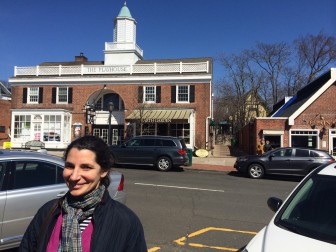
Micaela Porta
The thing that goes through my mind, how it makes sense to me is that I believe in people and I’m a relationship person. For me it’s all connected. My work on the Conservation Commission, my work on the vestry at St. Mark’s, being on the League of Women Voters, volunteering for the library. These are all of a piece, because I feel that ultimately where I’m most comfortable is sitting around a table with people, saying, ‘OK, what can we do? How do we get this done?’ And so the Conservation Commission is a tool for that. It’s not an end in itself. I’m not someone who wants board membership and titles and things. It’s more like, ‘Oh is that where I have to go to meet the people with their fingers on that button? Great. Let’s do it.’ And so that’s how it is for me. It’s all about neighbor to neighbor relationships.
That, to me, is great to hear. That’s what New Canaan is to many of us.
For sure.
I have the background from your website on Pesticide-Free New Canaan and the specifics of how a homeowner can pursue this. I want to know, for your organization and also for the larger effort that you’re addressing—when you think about down the road for your organization, what is the vision? Is it an entirely pesticide-free New Canaan? Is it something a little different? A different type of visibility or participation? A seat at more tables? Different tables?
I think from the beginning my goal was always to—at least publicly, you can’t do anything about private homes, though that’s what we’re trying to do—was to take all New Canaan public lands and make it pesticide-free. So that continues to be the goal. We try to get homeowners. We focus on homeowners going pesticide-free one at a time. But my vision for the long-term is that one day New Canaan will be a model. There are other communities that have done this. But that New Canaan will join those communities in being a model of that kind of stewardship. Now in terms of anything else, I think I’m specific to New Canaan. I have no ambition to grow this as a nonprofit that will have a compound and salaries and things. This is about New Canaan. It’s about helping my neighbors. It’s one thing that I know about that I can share with people and say, ‘Listen, this is a small thing you can do. It’s going to make your life and my life better, just do it.’ And I would hope other people can inform me about stuff like that, if somebody can say, ‘Oh Miki, you don’t know anything about this but just vote on this’ or ‘Push that button’ or ‘Buy this instead of that’ and it’s going to make everything better. Great. So, I guess for the long-term, I would love to say that there’s going to come a time when all of us will just be able to make better choices that are not going to impact our kids and our environment as adversely as they’ve been impacted to date. Many of us now are looking at situations that are so dire and that are preventable. So this is something easy we can all do to prevent all these other things from happening in the future. We can make this progress.